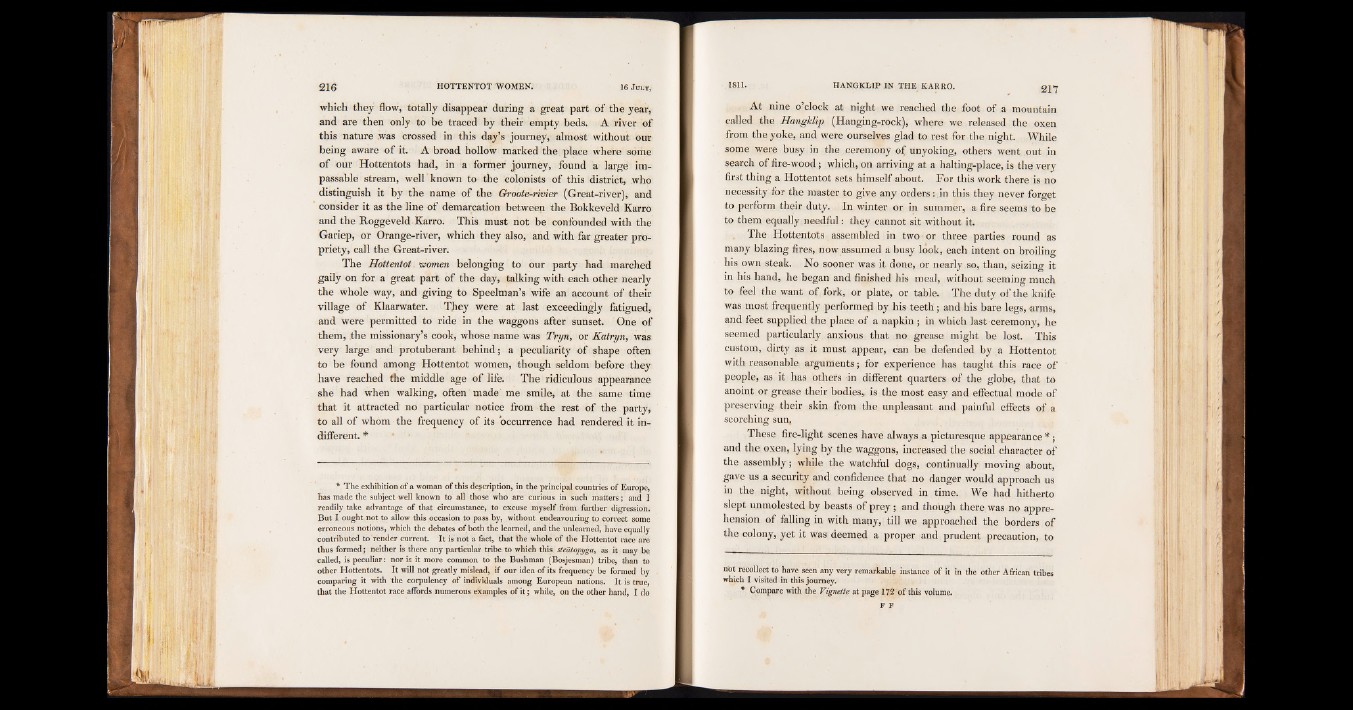
which they flow, totally disappear during a great part of the year,
and are then only to be traced by their empty beds. A river of
this nature .was crossed in this day’s journey, almost without our
being aware of it. A broad hollow marked the place where some
of our Hottentots had, in a former journey, found a large impassable
stream, well known to the colonists of this district, who
distinguish it by the name of the Groote-rivier (Great-river), and
consider it as the line of demarcation between the Bokkeveld Karro
and the Roggeveld Karro. This must not be confounded with the
Gariep, or Orange-river, which they also, and with far greater propriety,
call the Great-river.
The Hottentot women belonging to our party had marched
gaily on for a great part of the day, talking with each other nearly
the whole way, and giving to Speelman’s wife an account of their
village of Klaarwater. They were at last exceedingly fatigued,
and were permitted to ride in the waggons after sunset. One of
them, the missionary’s cook, whose name was Tryn, or Katryn, was
very large and protuberant behind; a peculiarity of shape often
to be found among Hottentot women, though seldom before they
have reached the middle age of life. The ridiculous appearance
she had when walking, often made me smile, at the same time
that it attracted no particular notice from the rest of the party,
to all of whom the frequency of its occurrence had rendered it indifferent.
*
* The exhibition of a woman of this description, in the principal countries of Europe,
has made the subject well known to all those who are curious in such matters; and I
readily take advantage of that circumstance, to excuse myself from further digression.
But I ought not to allow this occasion to pass by, without endeavouring to correct some
erroneous notions, which the debates of both the learned, and the unlearned, have equally
contributed to render current. I t is not a fact, that the whole of the Hottentot race are
thus formed; neither is there any particular tribe to which this steatopyga, as it may be
called, is peculiar: nor is it more common to the Bushman (Bosjesman) tribe, than to
other Hottentots. It will not greatly mislead, if our idea of its frequency be formed by
comparing it with the corpulency of individuals among European nations. I t is true,
that the Hottentot race affords numerous examples of i t ; while, on the other hand, I do
At nine o’clock at night we reached the foot of a mountain
called the Hangklip (Hanging-rock), where we released the oxen
from the yoke, and were ourselves glad to rest for the night. While
some were busy in the ceremony of unyoking, others went .out in
search of fire-wood; which, on arriving at a halting-place, is the very
first thing a Hottentot sets himself about. For this work there is no
necessity for the master to give any orders: in this they never forget
to perform their duty. In winter or in summer, a fire seems to be
to them equally needful: they cannot sit without it.
. The Hottentots assembled in two or three parties round as
many blazing fires, now assumed a busy look, each intent on broiling
his own steak. No sooner was it done, or nearly so, than, seizing it
in his hand, he began and finished his meal, without seeming much
to feel the want of fork, or plate, or table. The duty of the knife
was most frequently performed by his teeth ; and his bare legs, arms,
and feet supplied the place of a napkin ; in which last ceremony, he
seemed particularly anxious that no grease might be lost. This
custom, dirty as it must appear, can be defended by a Hottentot
with reasonable arguments; for experience has taught this race of
people, as it has others in different quarters of the globe, that to
anoint or grease their bodies* is the most easy and effectual mode of
preserving their skin from the unpleasant and painful effects of a
scorching sun,
These fire-light scenes have always a picturesque appearance *;
and the oxen, lying by the waggons, increased the social character of
the assembly; while the watchful dogs, continually moving about,
gave us a security and confidence that no danger would approach us
in the night, without being observed in time. We had hitherto
slept unmolested by beasts of prey; and though there was no apprehension
of falling in with many, till we approached the borders of
the colony, yet it was deemed a proper and prudent precaution, to
not recollect to have seen any very remarkable instance of It in the other African tribes
which I visited in this journey.
# Compare with the Vignette at page 172 o f this volume.
F F